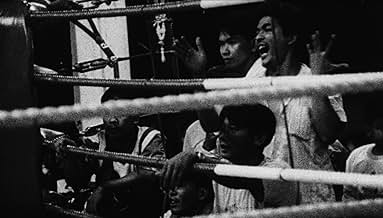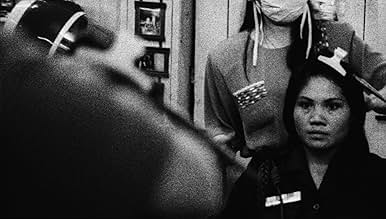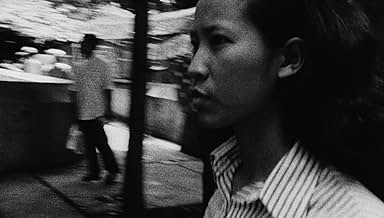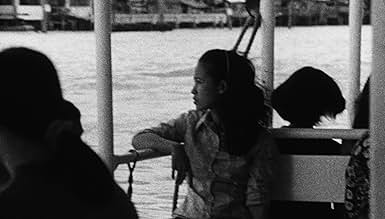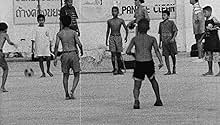AVALIAÇÃO DA IMDb
6,7/10
1,8 mil
SUA AVALIAÇÃO
Adicionar um enredo no seu idiomaA film crew documents a folk story-exquisite corpse combination by random Thai people; the story is reenacted.A film crew documents a folk story-exquisite corpse combination by random Thai people; the story is reenacted.A film crew documents a folk story-exquisite corpse combination by random Thai people; the story is reenacted.
- Prêmios
- 4 vitórias e 4 indicações no total
Avaliações em destaque
The strangest film I've seen in some time is an experimental docu-drama from Thailand called Mysterious Object at Noon, directed by Apichatpong Weerasethakul, a Thai architect who has an MFA in film from the School of the Art Institute of Chicago (which, when you think about it, is a great town for an architect to go to in order to study film). It's not a docu-drama in the American sense of the word, but rather a film that documents a narrative, the tale of a home study teacher and her disabled student. How it does this is what is so unusual. Working for over three years with an all-volunteer cast & crew which also means an ever-changing cast & crew Weerasethakul employed the surrealist game of the Exquisite Corpse, which, as described by one web site devoted to this practice,
was played by several people, each of whom would write a phrase on a sheet of paper, fold the paper to conceal part of it, and pass it on to the next player for his contribution.
Now imagine playing this same game with film, not only with the urban elites of Bangkok, but with villagers in Weerasethakul's native north who have only limited experience with cinema and no real concept of fiction. The results are both primitive and startling. Filmed in black & white with the cheapest imaginable equipment and film stock, Mysterious Object is something akin to a surrealist version of Dziga Vertov's Man with a Movie Camera set in the Thailand of the 1990s, which means everything from contemporary skyscrapers and freeway on-ramps to elephants wandering into the scene as some boys who've been playing a version of hacky sack try to improvise what might come next. One group of villagers act out their section, which includes music (some of it involving a mouth organ unlike anything I've ever seen before). Another woman, early on, simply tells her own story, which involves being sold by her father in return for bus fare. There is a long truck ride through Bangkok at the beginning that feels like an homage both to Vertov and to Tarkovsky's Solaris until the driver and his partner start trying to sell tuna. During the course of the film, the teacher gives birth tho that verb phrase doesn't really do justice to what actually happens to a young man who zips her unconscious body into a closet and ransacks the student's home, World War 2 comes to a conclusion, the populace is admonished to buy American products, aliens invade, and the teacher gets a rash. The young boy is both much loved and abandoned by his parents. At one point, the boy to whom the teacher gives birth turns into a murderous giant. The one element that Weerasethakul uses to keep his various narrative threads from entirely spinning out of control is a small team of actors who periodically act out some of the threads narrated by different speakers.
This film works for many of the same reasons that any artwork that is actively trying to invent its own genre does in this sense, Man with a Movie Camera, as well as books as diverse as Tristram Shandy, The Childlike Life of the Black Tarantula, Moby Dick, Spring & All and Visions of Cody, are almost parallel projects. Each questions everything and makes no assumptions as to how to proceed. In this context, even a wrong decision (presuming of course we could define such) would be a fresh one. At the same time, Weerasethakul clearly understands this role as historical there is a scene in which the film-maker and his colleagues are walking along & one comments "We should have had a script." The film ends when & where it does because that's where, literally, the film stock Weerasethakul had at his disposal ran out.
If you don't care for experimental cinema, you can almost be certain that you're going to hate this film. Even if you love the work of Stan Brakhage, Warren Sonbert & Abigail Child, you may find it hard to imagine that something like this can still be produced in the 21st century. Would it still hold its fascination if the film were in English about Oakland? Frankly, it might not Steve Benson, who first turned me on Mysterious Object, calls Tropical Malady, Weerasethakul's other film available through NetFlix, "catastrophically disappointing" tho it won the Jury Prize at Cannes in 2004. In any event, there is this film, which taken on its own is a dive into a culture and into a perspective on cinema that few of us will every have the opportunity to experience directly. As such, it's a trip you should probably take.
was played by several people, each of whom would write a phrase on a sheet of paper, fold the paper to conceal part of it, and pass it on to the next player for his contribution.
Now imagine playing this same game with film, not only with the urban elites of Bangkok, but with villagers in Weerasethakul's native north who have only limited experience with cinema and no real concept of fiction. The results are both primitive and startling. Filmed in black & white with the cheapest imaginable equipment and film stock, Mysterious Object is something akin to a surrealist version of Dziga Vertov's Man with a Movie Camera set in the Thailand of the 1990s, which means everything from contemporary skyscrapers and freeway on-ramps to elephants wandering into the scene as some boys who've been playing a version of hacky sack try to improvise what might come next. One group of villagers act out their section, which includes music (some of it involving a mouth organ unlike anything I've ever seen before). Another woman, early on, simply tells her own story, which involves being sold by her father in return for bus fare. There is a long truck ride through Bangkok at the beginning that feels like an homage both to Vertov and to Tarkovsky's Solaris until the driver and his partner start trying to sell tuna. During the course of the film, the teacher gives birth tho that verb phrase doesn't really do justice to what actually happens to a young man who zips her unconscious body into a closet and ransacks the student's home, World War 2 comes to a conclusion, the populace is admonished to buy American products, aliens invade, and the teacher gets a rash. The young boy is both much loved and abandoned by his parents. At one point, the boy to whom the teacher gives birth turns into a murderous giant. The one element that Weerasethakul uses to keep his various narrative threads from entirely spinning out of control is a small team of actors who periodically act out some of the threads narrated by different speakers.
This film works for many of the same reasons that any artwork that is actively trying to invent its own genre does in this sense, Man with a Movie Camera, as well as books as diverse as Tristram Shandy, The Childlike Life of the Black Tarantula, Moby Dick, Spring & All and Visions of Cody, are almost parallel projects. Each questions everything and makes no assumptions as to how to proceed. In this context, even a wrong decision (presuming of course we could define such) would be a fresh one. At the same time, Weerasethakul clearly understands this role as historical there is a scene in which the film-maker and his colleagues are walking along & one comments "We should have had a script." The film ends when & where it does because that's where, literally, the film stock Weerasethakul had at his disposal ran out.
If you don't care for experimental cinema, you can almost be certain that you're going to hate this film. Even if you love the work of Stan Brakhage, Warren Sonbert & Abigail Child, you may find it hard to imagine that something like this can still be produced in the 21st century. Would it still hold its fascination if the film were in English about Oakland? Frankly, it might not Steve Benson, who first turned me on Mysterious Object, calls Tropical Malady, Weerasethakul's other film available through NetFlix, "catastrophically disappointing" tho it won the Jury Prize at Cannes in 2004. In any event, there is this film, which taken on its own is a dive into a culture and into a perspective on cinema that few of us will every have the opportunity to experience directly. As such, it's a trip you should probably take.
An interesting film, more for the idea behind it and moments captured than the overall execution.
A filmmaker rolls around town in search of a story, making the film we see. It begins with long footage of driving around Bangkok, then we segue to the story proper with a woman being interviewed, asked about a story.
The story is made-up, the point is not the story of course, but dismantling the conventional telling. Different people are interviewed who bend the story to their fancy, adding stuff. We are not entirely sure who among them are actors coached on what to say, who are passers-by blurting out what comes in their heads. We can tell that some of it was obviously blocked to be filmed, some covertly staged as real and some stolen from glances but the whole is pretty seamless.
This is an opportunity to film all sorts of activities and splice it together to see what kind of sense comes out; among them an amateur theatric production of the story, a simulated TV interview filmed off the TV, (faux?) newsreel footage, real scenes of boxing, a singing contest and sex show, a scene from the film but the camera keeps rolling through the break. When the crippled boy is assigned a random background by one of the interviewees, in the following scene his teacher acquires the same background of war and family loss.
In the West, we have similar films of stories about stories in Saragossa Manuscript and such, where usually the point is structure, hidden meaning and the divination of self.
In the East, specifically Thailand, they have their own traditions of light storytelling and meta-narrative sorting of concepts, both defined by cultural proximity to India. Among the three 'holy' texts of their native Buddhism is a body of work called Abhidharma, teachings about the teachings. Composed after the Buddha's time, commentaries upon commentaries form a complex, layered web of cataloguing various ontological attributes of reality, phenomena and self. Boring if you ever try to read it.
On a historical note, there is evidence that abhidharmic influence in the north of India in turn rippled West through Persia to influence gnostic thought, and East through the Silk Road as both reaction to its scholasticism and elaboration of it contributed to early Chinese Buddhism. In both cases, the distinction is made between mere intellectual reasoning in the abhidharmic vein, and expansive meditative wisdom that looks directly at things. (respectively, gnosis and prajna)
Anyway, the film has no direct link to all that except as pointing to the mesh of meta-narrative.
And it's cool to note that springing from a Buddhist background, in this film of stories about stories the stories are transient, illusory confabulations, there's no intrinsic meaning or symbolism to them, there's no structure beyond co-dependent arising of narrator and image, and the narrator is neither a single self nor on some journey to enlightenment. Nice, if you don't burden yourself with futilely trying to organize the tangle, just directly look at the wondrous nothingness.
The last story is made-up by schoolchildren, collapsing in a fantastical, meaningless heap of witch tigers and magical swords, illusory child's play.
The closing shots are of children kicking a ball, the rush of actual life outside the stories which is the most mysterious object of all.
A filmmaker rolls around town in search of a story, making the film we see. It begins with long footage of driving around Bangkok, then we segue to the story proper with a woman being interviewed, asked about a story.
The story is made-up, the point is not the story of course, but dismantling the conventional telling. Different people are interviewed who bend the story to their fancy, adding stuff. We are not entirely sure who among them are actors coached on what to say, who are passers-by blurting out what comes in their heads. We can tell that some of it was obviously blocked to be filmed, some covertly staged as real and some stolen from glances but the whole is pretty seamless.
This is an opportunity to film all sorts of activities and splice it together to see what kind of sense comes out; among them an amateur theatric production of the story, a simulated TV interview filmed off the TV, (faux?) newsreel footage, real scenes of boxing, a singing contest and sex show, a scene from the film but the camera keeps rolling through the break. When the crippled boy is assigned a random background by one of the interviewees, in the following scene his teacher acquires the same background of war and family loss.
In the West, we have similar films of stories about stories in Saragossa Manuscript and such, where usually the point is structure, hidden meaning and the divination of self.
In the East, specifically Thailand, they have their own traditions of light storytelling and meta-narrative sorting of concepts, both defined by cultural proximity to India. Among the three 'holy' texts of their native Buddhism is a body of work called Abhidharma, teachings about the teachings. Composed after the Buddha's time, commentaries upon commentaries form a complex, layered web of cataloguing various ontological attributes of reality, phenomena and self. Boring if you ever try to read it.
On a historical note, there is evidence that abhidharmic influence in the north of India in turn rippled West through Persia to influence gnostic thought, and East through the Silk Road as both reaction to its scholasticism and elaboration of it contributed to early Chinese Buddhism. In both cases, the distinction is made between mere intellectual reasoning in the abhidharmic vein, and expansive meditative wisdom that looks directly at things. (respectively, gnosis and prajna)
Anyway, the film has no direct link to all that except as pointing to the mesh of meta-narrative.
And it's cool to note that springing from a Buddhist background, in this film of stories about stories the stories are transient, illusory confabulations, there's no intrinsic meaning or symbolism to them, there's no structure beyond co-dependent arising of narrator and image, and the narrator is neither a single self nor on some journey to enlightenment. Nice, if you don't burden yourself with futilely trying to organize the tangle, just directly look at the wondrous nothingness.
The last story is made-up by schoolchildren, collapsing in a fantastical, meaningless heap of witch tigers and magical swords, illusory child's play.
The closing shots are of children kicking a ball, the rush of actual life outside the stories which is the most mysterious object of all.
This approaches art, and does so from an oblique angle and in an exotic locale. That being said for me, it never achieves that art., Despite the loose effort to stitch a thread of a story through this, and some curious disjointed elements, the whole does not hold.
See this film if you are willing to bring a lot to the party. (And kudos to you, davidals@msn.com) Or play it in your rental store, or during a party with the sound off, and it will probably snare more fish than it does standing alone with you and your remote.
I'm all for experimental film, this could have been whittled down to a 7 minute beauty for the Ann Arbor Film Fest; at 83 min, it came across as a chore, a corpse less than exquisite. And while I'm coming across as the anti-hipster, why black (or almost a dusty brown) and white for this film? Color I think would have made this more florid and captivating, although perhaps more common-place and thus undermined the art?
Wait till your film professor assigns this one to you.
3/10
See this film if you are willing to bring a lot to the party. (And kudos to you, davidals@msn.com) Or play it in your rental store, or during a party with the sound off, and it will probably snare more fish than it does standing alone with you and your remote.
I'm all for experimental film, this could have been whittled down to a 7 minute beauty for the Ann Arbor Film Fest; at 83 min, it came across as a chore, a corpse less than exquisite. And while I'm coming across as the anti-hipster, why black (or almost a dusty brown) and white for this film? Color I think would have made this more florid and captivating, although perhaps more common-place and thus undermined the art?
Wait till your film professor assigns this one to you.
3/10
A camera attached to a moving car takes us down a busy city street in Thailand. Abruptly, the car turns into a narrow alley where we see brush grass and run down shacks. As the camera enters one of the houses, a heavy-set woman speaks of the trauma involved in her being sold into prostitution by her father. When she is finished, an off-camera voice asks her to tell another story, real or fiction. It is then that we begin to sense that cinematically we are in unchartered territory. Internationally acclaimed Thai director Apichatpong Weerasethakul's first feature Mysterious Object at Noon is an offbeat mixture of reality and fiction in which there is no screenplay or linear narrative, only a story created and added to by each participant in the mode of the French game "exquisite corpse".
The story the woman first tells is that of a teacher named Dogfahr whose young pupil is a cripple confined to a wheelchair. The tale is then dramatized on screen by non actors alternating with the talking storyteller. As the camera moves north and south of Bangkok into the Thai countryside, a cross section of Thai's continue the story by adding a few lines. These include two deaf girls using sign language, a song and dance troupe, and children in a rural Thai school. With each addition, the tale becomes vastly different and increasingly fantastic. The mysterious object in the title falls from the teacher who has collapsed and turns into an extraterrestrial boy with strange powers, a duplicate teacher, and finally a "witch tiger" and a magic sword.
Some sequences stand by themselves and are without any relation to the continuing storyline. The teacher brings her father to the doctor for a hearing test and complains of a strange line around her neck which the doctor dismisses as an allergy or the effect of wearing her necklace. Parents talk of a boy who escaped death in a plane crash because he was protected by amulets, and a scene shows women bargaining at a fish market. An experimental film with a small budget shot in 16-millimeter black and white, Mysterious Object at Noon glows with warmth and playfulness. As it progresses, it also slows down and becomes more of a meditation on Thai culture, creating a mood of tranquility and peace. Like Seinfeld, it is ostensibly "about nothing", but turns out to be about everything.
The story the woman first tells is that of a teacher named Dogfahr whose young pupil is a cripple confined to a wheelchair. The tale is then dramatized on screen by non actors alternating with the talking storyteller. As the camera moves north and south of Bangkok into the Thai countryside, a cross section of Thai's continue the story by adding a few lines. These include two deaf girls using sign language, a song and dance troupe, and children in a rural Thai school. With each addition, the tale becomes vastly different and increasingly fantastic. The mysterious object in the title falls from the teacher who has collapsed and turns into an extraterrestrial boy with strange powers, a duplicate teacher, and finally a "witch tiger" and a magic sword.
Some sequences stand by themselves and are without any relation to the continuing storyline. The teacher brings her father to the doctor for a hearing test and complains of a strange line around her neck which the doctor dismisses as an allergy or the effect of wearing her necklace. Parents talk of a boy who escaped death in a plane crash because he was protected by amulets, and a scene shows women bargaining at a fish market. An experimental film with a small budget shot in 16-millimeter black and white, Mysterious Object at Noon glows with warmth and playfulness. As it progresses, it also slows down and becomes more of a meditation on Thai culture, creating a mood of tranquility and peace. Like Seinfeld, it is ostensibly "about nothing", but turns out to be about everything.
i took my girlfriend to see this one after reading a very promising article about it in my monthly cinema newspaper. i regretted it after about 15 minutes of the movie. the main idea to it, to let a story develop by it's protagonists, thus making it a semi documentary, seems promising, but suffers under the usual problems movies have that relay on their actors as directors. they are non. so the movie is constantly on the verge of failure, while thru most parts being plain - i am sorry, but i have to use that word - boring. it is, as the short movies of weerasethakul, heavily based on long steady shots and seemingly unconnected pieces of sound and dialog. this may work as an installative work in an art context but definitely fails to deliver when watching it for about 90 minutes in a cinema. the only refreshing moments of the movie are the ones of self reference. one in which one assistant of the director appears, telling him that the whole thing does not work and that they better should have written a script, and one in which a kid actor is asking if he finally can go home (and if not, if afterwords he at least can get a burger at kfc :). i have to admit i really felt with the kid.
Você sabia?
- CuriosidadesFilming was carried out for three years with a volunteer crew, and only stopped when the camera broke down - the last shot of the movie is literally the last piece of film that passed through the camera.
- ConexõesFeatured in 40 Days to Learn Film (2020)
Principais escolhas
Faça login para avaliar e ver a lista de recomendações personalizadas
- How long is Mysterious Object at Noon?Fornecido pela Alexa
Detalhes
- Tempo de duração1 hora 29 minutos
- Cor
- Mixagem de som
- Proporção
- 1.37 : 1(original 16mm negative ratio)
Contribua para esta página
Sugerir uma alteração ou adicionar conteúdo ausente

Principal brecha
By what name was Objeto Misterioso ao Meio-Dia (2000) officially released in India in English?
Responda

